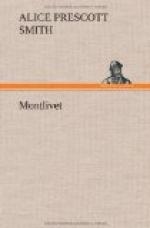“To marry? It is the moon of flowers, and the birds are mating. It is well. The white thrush shall sleep in my lodge to-night. I will go elsewhere. Come,” and pointing to the door, he would have driven the priest and myself outside without more words.
I glanced around. The lodge was unexpectedly neat, and though I dreaded to leave the woman in the smoke, I knew it was unwise to protest. Would she be willing to stay? She was often ruled by impulse, and it would be like her to clamor for the clean starlight. I told her, in short phrase, what the chief had said. “And I beg you to show as little repugnance as possible,” I added.
She listened without showing me her eyes,—which were always the only index I had to what was in her mind.
“Thank the chief for his hospitality,” she rejoined, and she looked toward Onanguisse, and bowed with a pretty gesture of acceptance. Then she walked over to me.
“When you thought me a man,” she said hurriedly, and in a tone so low that only I could hear, “you trusted somewhat to my judgment,—even though you saw me fail. When you found me a woman, you trusted less, and since—since you arranged to marry me, you have assumed that I would fail you at every turn. Ours is a crooked road, monsieur, and there are many turns ahead. If you burden your mind so heavily with me you cannot attend to what is your real concern. Trust me more. Think less about me. I will show no irritation, no initiative, and I will follow where you point. I should like to think that you would rest to-night,—rest care free. I wish you good-night, monsieur.”
She had spoken with a hurry of low-toned words that left me no opening, and now she turned away before my tongue was ready to serve my mind. She bowed us to the door, and the rush mat fell between us. I watched the old chief stalk away and wondered what was in his mind.
“Is this the first white woman he has seen?” I asked the priest.
Father Nouvel smiled reflectively at the retreating back. “Oh, no,” he replied. “He has been in Quebec. He is the chief you must have heard quoted, who vaunted that God had made three great men,—La Salle, Frontenac, and himself. He is a crafty man and able. You see that he never squanders strength nor words. No, monsieur, you must not follow me.” He stopped to lay a hand on my shoulder. “Take heed, my son. Ox that you look to be for endurance, there are yet lines under your eyes. I will not talk to you to-night. Sleep well. I take it for granted that you prefer to sleep as I do, under the stars.” And putting out his thin, ivory hand in blessing, he went away.
But I was not ready for sleep. I went to the canoes, sent the men to rest, and found food which I carried to the woman, and left, with a whispered word, outside her door. Then I ate some parched corn, and lighting my pipe, lay down to take counsel of what had befallen me. I lay at some distance from the woman’s lodge, but not so far but that I could see the rush mat that hung before it. The Indians watched me, but kept at a distance. I saw that Onanguisse had given commands.




